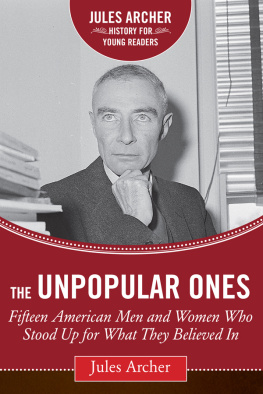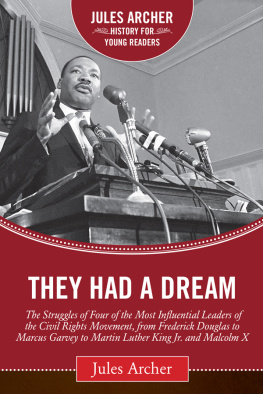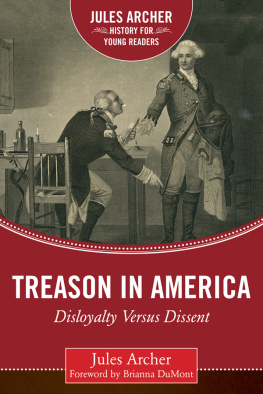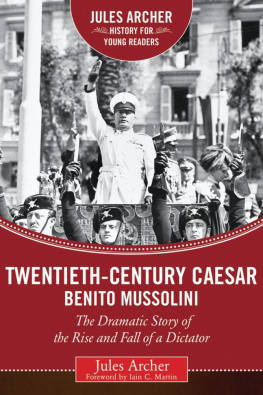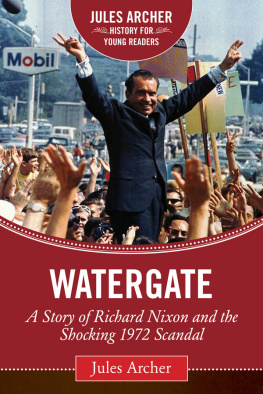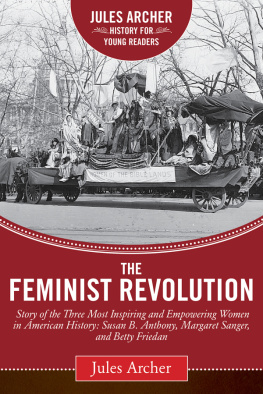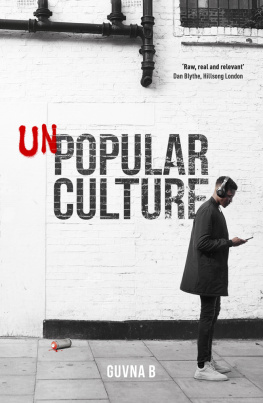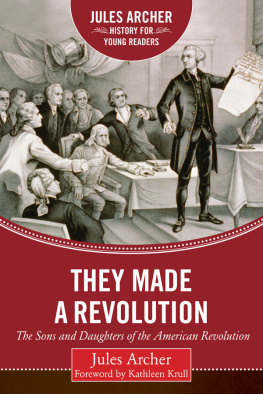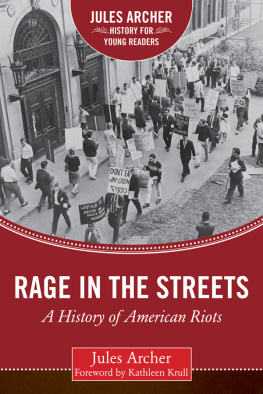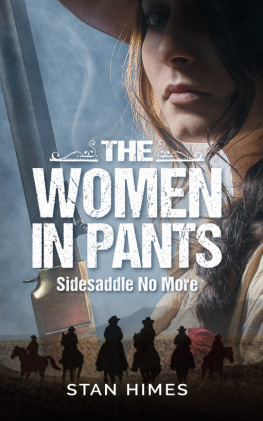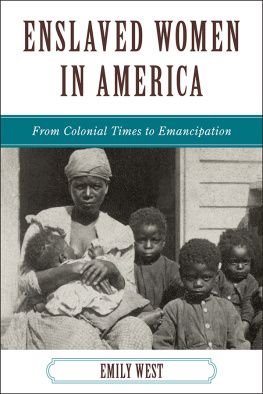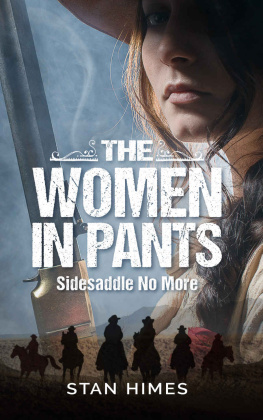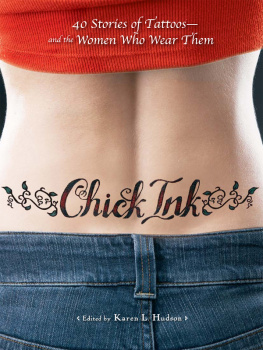Historical texts often reflect the time period in which they were written, and new information is constantly being discovered. This book was originally published in 1968, and much has changed since then. While every effort has been made to bring this book up to date, it is important to consult multiple sources when doing research.
Copyright 1968 by Jules Archer
Foreword 2016 by Sky Pony Press, an imprint of Skyhorse Publishing, Inc.
First Sky Pony Press edition, 2016
All rights reserved. No part of this book may be reproduced in any manner without the express written consent of the publisher, except in the case of brief excerpts in critical reviews or articles. All inquiries should be addressed to Sky Pony Press, 307 West 36th Street, 11th Floor, New York, NY 10018.
Sky Pony Press books may be purchased in bulk at special discounts for sales promotion, corporate gifts, fund-raising, or educational purposes. Special editions can also be created to specifications. For details, contact the Special Sales Department, Sky Pony Press, 307 West 36th Street, 11th Floor, New York, NY 10018 or .
Sky Pony is a registered trademark of Skyhorse Publishing, Inc., a Delaware corporation.
Visit our website at www.skyponypress.com.
10 9 8 7 6 5 4 3 2 1
Library of Congress Cataloging-in-Publication Data is available on file.
Series design by Brian Peterson
Cover photo credit Associated Press
PICTURE CREDITS
Brown Brothers, .
Print ISBN: 978-1-63450-200-9
Ebook ISBN: 978-1-63450-899-5
Printed in the United States of America
To August Lenniger
for the past twenty-five years
CONTENTS
ROGER WILLIAMS
JOHN PETER ZENGER
THOMAS PAINE
ANNE ROYALL
JOSEPH PALMER
HORACE GREELEY
HENRY DAVID THOREAU
JONATHAN WALKER
AMELIA JENKS BLOOMER
EUGENE DEBS
WOODROW WILSON
BETHENIA OWENS
MARGARET SANGER
J. ROBERT OPPENHEIMER
J. WILLIAM FULBRIGHT
FOREWORD
You might suspect, from the title, that this is going to be a teenage angst-fest, a depressing saga of popular versus unpopular kids.
Its actually much more momentous: fifteen true stories of Americans in stark conflict with their times. They spoke their minds even when others strongly disagreed, and being unpopular was the least of their problems. These outlaws were tortured, pelted with rotten eggs and animal manure, branded with a hot iron, imprisoned, humiliated, run out of town, and more. From Roger Williams (fighting the good fight for religious freedom and the separation of church and state) to J. William Fulbright (who, in one of the most revelatory chapters, did everything in his power to make Americans more worldly and sophisticated), these were heroes for being on the right side of history even when it hurt.
This book is nothing less than a party in honor of one of our most cherished freedoms, the freedom of speech. First published in the tumultuous, protest-filled year of 1968, it was part of the America in the Making series.
I was lucky enough to know Jules Archer. While working as a senior editor at Harcourt I took on his Winners and Losers: How Elections Work in America (1984), which was a School Library Journal Best Book and a Notable Childrens Trade Book in the Field of Social Studies. Then I worked with him on a title dear to my heart The Incredible Sixties: The Stormy Years that Changed America (1986), another SLJ Best Book.
I knew Jules Archer to be a passionate idealist, hugely concerned with inspiring young people to become informed citizens, anxious about righting societys wrongs and helping as much as possible. Unlike some other authors I wont name, Archer was always a total professional, dependable, and a pleasure to work with. Archers reviews were always stellar, making him a go-to person for social studies nonfiction.
At one point I traveled from San Diego to meet Archer in Santa Cruz. In person he was courtly, kind, great company. All his life he remained politically active, while also roller-skating, playing chess, and writing away. He was perhaps the most prolific writer of nonfiction books for young people of his day.
This book is one for dipping intoand naturally I turned to the women first. Amelia Bloomer we know as justifiably famous for donning pants in 1851. Bloomers caught onan early symbol for womens independencedespite the first wearers being harassed by mobs of males howling crude remarks. As with all his subjects, Archer gives us a full biographical portrait, explaining how Bloomer arrived at her unpopular stance on pants.
It was daring of him to include Margaret Sanger, still controversial (in some circles) after all these years. Starting in 1912, horrified at what the high birthrate did to womens health, Sanger dared to publish information on birth control. For trying to help women be more in control over their lives, she lost her husband, gained powerful enemies, and was imprisoned for obscenity. She never gave up, no matter the obstacles, and went on to found Planned Parenthoodshe is a true American heroine.
Bethenia Owens was a new name to me. We know Elizabeth Blackwell as the first woman doctor in America, practicing in New York. But Owens, facing enormous, fascinating challenges, was for a time the only woman doctor in the entire West. Threatened with being tarred and feathered, she was instead run out of one town and forced to move to another.
The person most deserving of a book of her own is Anne Royall, one of Archers quirkier choices. Known for publishing brutally honest opinions about religion, politicians, and everything else, she was Americas first woman journalist. The punishments for her were harsh: once an enemy beat her so severely she couldnt walk for three years, and, in 1829, she was tried and found guilty of being a Common Scold, barely escaping the humiliation of the ducking stool.
Archers quirkiest choice is Joseph Palmer, a man who suffered mightily in 1830 Massachusetts because he dared to wear a large bushy beard. (It was a time when smooth faces on men were de rigueur.) Also new to me was Jonathan Walker, one of the earliest abolitionists, who actively helped Florida slaves escape. In 1844, he was thrown in jail, chained, and branded with a hot ironSS for Slave Stealerall described in nauseating detail.
Possibly the biggest hero in the book is heavy thinker Henry David Thoreau. The ultimate nonconformist, hes guided everyone from Gandhi to Dr. Martin Luther King Jr. to many protestors today. He didnt suffer for his beliefs as much as some others did, but he strikes a contemporary note that could make a good tattoo: The fear of displeasing the world ought not in the least to influence my actions.
And theres much more. John Peter Zenger, who went a long way to uphold freedom of the press in America. Thomas Paine, the Common Sense guy who was one of the architects of the American Revolution. Horace Greeley, who not only said, Go West, young man, but also advocated a plethora of causes unpopular enough to bring constant death threats. Eugene Debs, always on the side of the workers, not the 1 percent. Woodrow Wilson, for his promotion of the international peace-keeping organization that became the United Nations. J. Robert Oppenheimer, who created the atom bomb and was shunned for speaking out against its use.
The careful reader will learn a ton of American history hereslightly in the vein of contemporary historian Howard Zinn, including the outsiders, not skirting from controversy.

